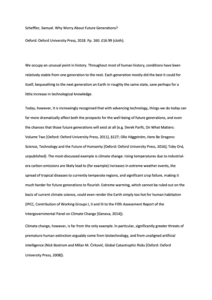Hilary Greaves: Book review of Scheffler's "Why worry about future generations?"
Other papers
The Shutdown Problem: An AI Engineering Puzzle for Decision Theorists – Elliott Thornley (Global Priorities Institute, University of Oxford)
I explain and motivate the shutdown problem: the problem of designing artificial agents that (1) shut down when a shutdown button is pressed, (2) don’t try to prevent or cause the pressing of the shutdown button, and (3) otherwise pursue goals competently. I prove three theorems that make the difficulty precise. These theorems suggest that agents satisfying some innocuous-seeming conditions will often try to prevent or cause the pressing of the shutdown button, even in cases where it’s costly to do so. I end by noting that…
AI alignment vs AI ethical treatment: Ten challenges – Adam Bradley (Lingnan University) and Bradford Saad (Global Priorities Institute, University of Oxford)
A morally acceptable course of AI development should avoid two dangers: creating unaligned AI systems that pose a threat to humanity and mistreating AI systems that merit moral consideration in their own right. This paper argues these two dangers interact and that if we create AI systems that merit moral consideration, simultaneously avoiding both of these dangers would be extremely challenging. While our argument is straightforward and supported by a wide range of pretheoretical moral judgments, it has far-reaching…
Moral uncertainty and public justification – Jacob Barrett (Global Priorities Institute, University of Oxford) and Andreas T Schmidt (University of Groningen)
Moral uncertainty and disagreement pervade our lives. Yet we still need to make decisions and act, both in individual and political contexts. So, what should we do? The moral uncertainty approach provides a theory of what individuals morally ought to do when they are uncertain about morality…

